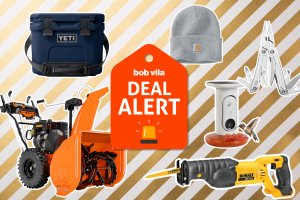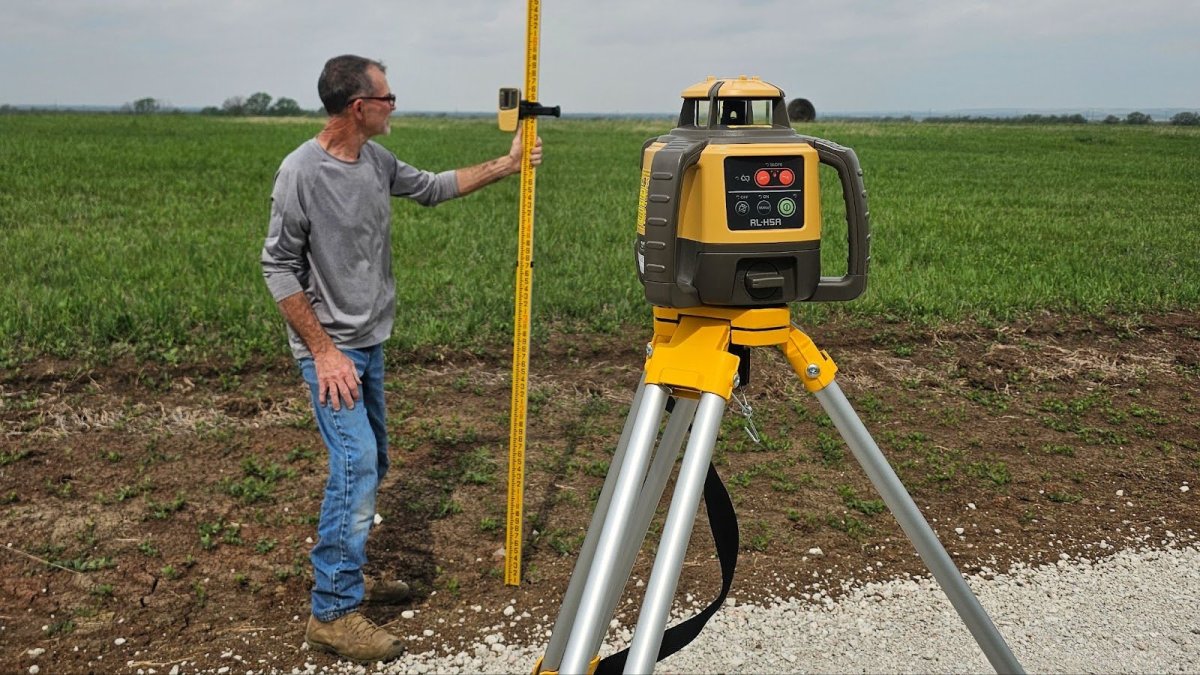

We may earn revenue from the products available on this page and participate in affiliate programs. Learn More ›
I remember the days of using a long, clear tube filled with water to establish level when setting concrete foundation forms. While that’s still a highly accurate method (water will always seek a perfect level), it has some obvious drawbacks, so I was excited when I got the chance to test three highly rated self-leveling rotary laser levels.
While all the models I tested performed well, the Topcon RL-H5A stood out from the bunch, winning the top spot in the lineup. Keep reading to find out what I really liked about the RL-H5A (there’s a lot to like) as well as what I feel Topcon could do to improve it even further.
Topcon’s RL-H5A Rotary Laser Level: At a Glance
Rating: 4.8/5

SPECS
- Type: Rotary red beam
- Accuracy: 1/16 inch at 100 feet
- Maximum range: 2,600 feet (diameter)
- Protection: IP66
PROS
- Highly accurate to within 1/16 inch at 100 feet
- Self-leveling feature ensures the beam is horizontal and level
- Emits a beam up to 1,300 feet in all directions, creating a circular range of 2,600 feet
- Slope function up to 5 degrees makes it possible to shoot grade on a slant
- Rugged carrying case keeps the laser, receiver, and batteries safe and secure
CONS
- No plumb (vertical beam), which may limit some users
- Vital accessories (tripod, grade rod, and red glasses) not included
Get the Topcon laser level at:
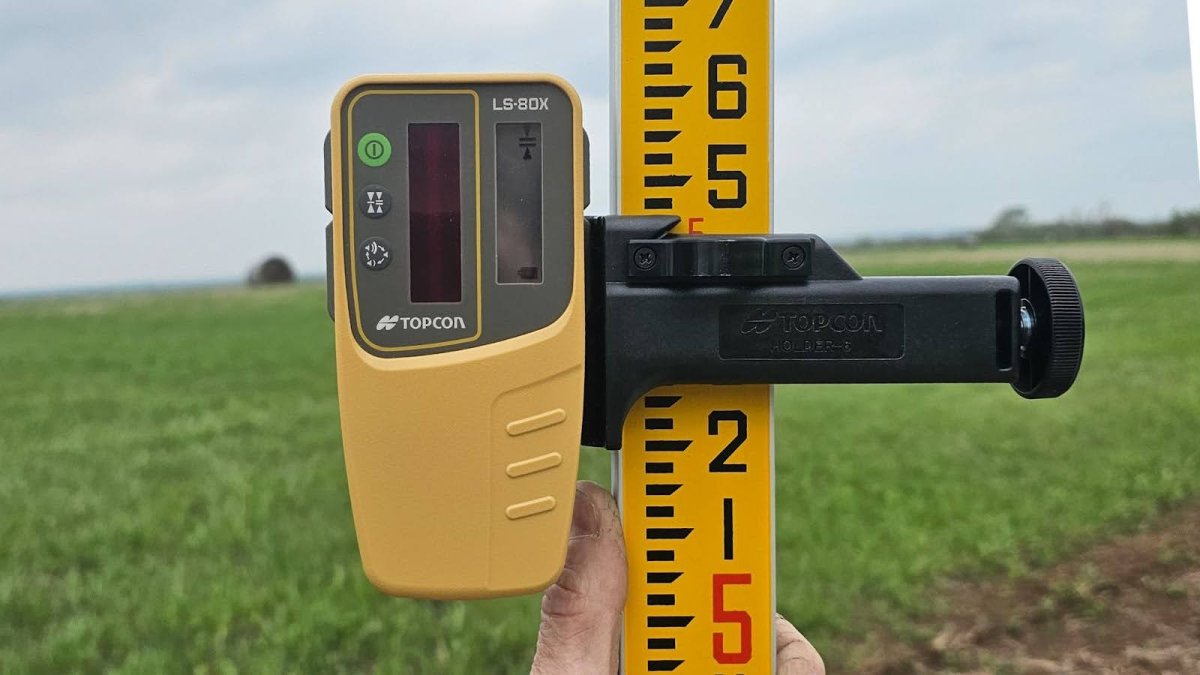
What is the Topcon RL-H5A rotary laser level?
The RL-H5A is a self-leveling construction laser that emits a rotating 360-degree red beam up to 1,300 feet, creating a circular diameter of up to 2,600 feet. It’s made by Topcon Corporation, an international leader in producing precision digital measurement and positioning equipment for the construction, agriculture, and healthcare industries.
It comes with the Tapcon LS-80X receiver that detects the beam when it can’t be seen. It can be challenging for the human eye to see a red beam in daylight—even on cloudy days—so having the receiver is crucial. The receiver expands the laser’s use, making it suitable for sizable outdoor excavation projects, such as establishing new driveways or grading a yard for efficient drainage. Red beams from laser levels are also relatively easy to see indoors, making models like this one useful for leveling projects such as hanging cabinets and ensuring outlets are all at the same height.
Accuracy and Self-Leveling
Horizontal self-leveling means the RL-H5A automatically adjusts its beam to be level with the earth’s surface, guided by gravitational pull. (This is the same gravitational effect that causes water to seek a level.) The RL-H5A self-levels within 5 degrees. All I had to do was level the tripod using its built-in bubble level. Then, I attached the RL-H5A to the tripod and booted it up. Within a few seconds, it began emitting a 360-degree beam.
Next, I placed the Topcon RL-H5A on a crooked tripod to see what would happen. I turned the tool on, but the beam didn’t rotate because it was positioned at an angle greater than 5 degrees from horizontal.
The ability to self-level is standard technology for a rotary laser level. I performed a crude water tube test to see if the RL-H5A would match the water level in a clear tube, and the RL-H5A was spot-on. Topcon rates this level as accurate to within 1/16 inch at 100 feet. For projects such as installing upper cabinets, this degree of precision is critical.

Can I shoot a sloped grade with this rotary laser level?
Yes, up to a 5-degree slope. However, the Tapcon RL-H5A doesn’t automatically calculate the grade for you—you’ll still need to do the math yourself to determine the correct grade for your project. Some laser levels can calculate slope, known as “slope-matching lasers” or “slope lasers,” but these are typically much more expensive.
Still, I found the RL-H5A’s slope function very handy for shooting a 2 percent slope to ensure my yard’s drainage grade was accurate. To shoot the slope, I set up the RL-H5A next to my home’s foundation. Then, my helper attached the LS-80X receiver to the grade rod and stood 100 feet from the foundation. We established a horizontal level by raising or lowering the receiver on the grade rod until it was level with the RL-H5A’s beam (it beeps when it’s level).
After that, my helper slid the receiver 2 feet lower on the grade rod, and then I pushed the slope button on the RL-H5A to tilt the beam downward until the receiver detected it and beeped. That gave us a perfect 2 percent slope. If we had been actively grading the yard, we would have been able to check the grade at any point between the starting and stopping points, and it would have reflected a 2 percent slope.
Design and Durability
The Topcon laser level features a heavy-duty polyethylene housing with an IP66 rating, which means it is dustproof and water-resistant. As part of my hands-on testing, I sprayed the RL-H5A with water from my garden hose to simulate what might happen if caught in a rain shower. I let it dry before trying to turn it on. It powered on without any issues.
I also found the LS-80X receiver to be well built and durable. It can be used with a rechargeable battery pack that’s sold separately. Alternatively, you can pick up a set of four rechargeable D-cell batteries and a charger to power the unit that way, which is what I did.
I really liked the rugged carry case that came with this Topcon laser level. It features tough precision-molded plastic to hold and protect the laser, receiver, and extra batteries. It was easy to fit the components into the case, and it snapped snugly. It didn’t even pop open when the whole thing accidentally tumbled from the back of the pickup truck onto the gravel driveway. But letting it fall out of the back of a truck isn’t a good idea—try to keep it in a safe place.
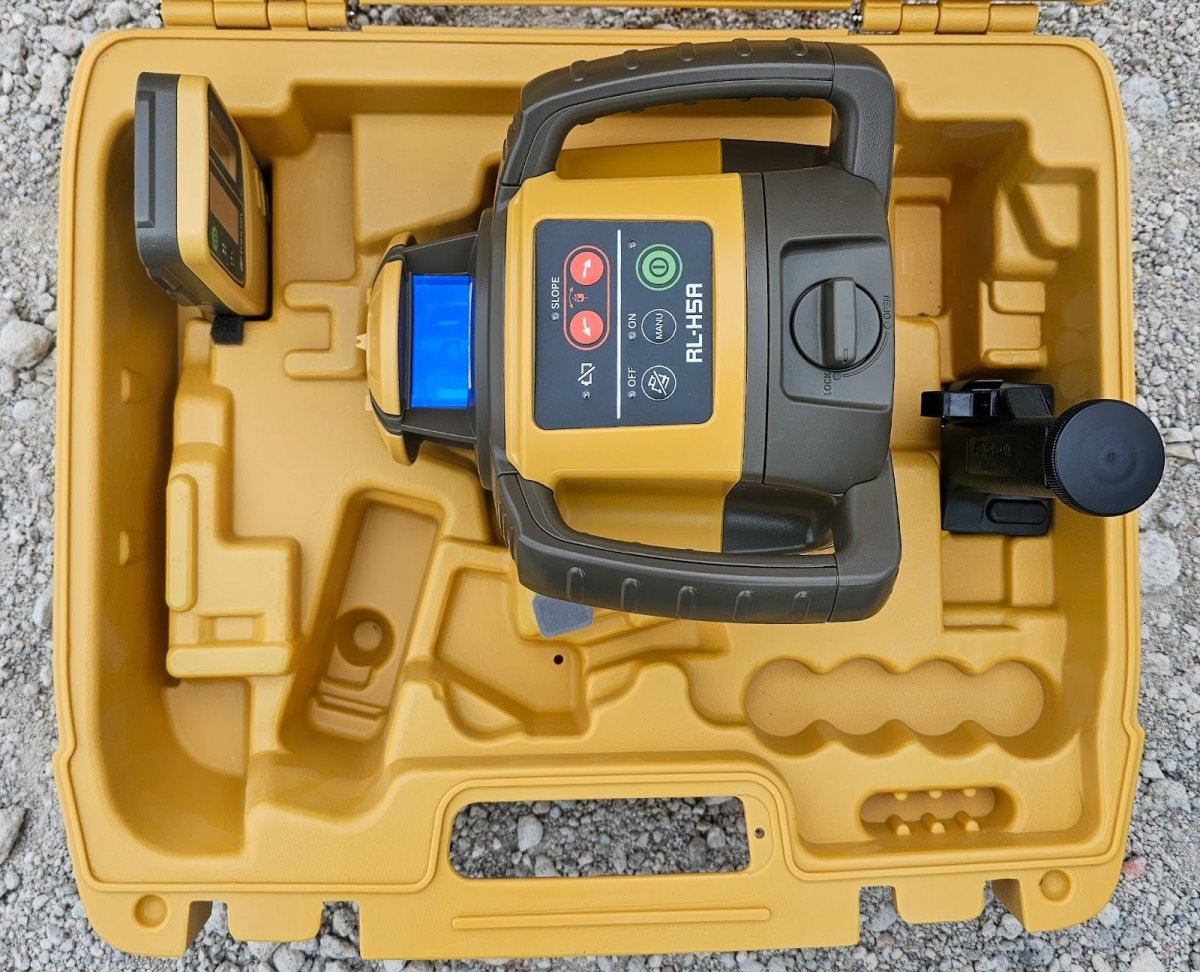
Performance Particulars
The Topcon RL-H5A rotary laser level performed impressively in my tests. It’s not perfect, but what it does, it does very well. If I had one wish, it would be for Tapcon to add a vertical laser feature to the RL-H5A. It’s far from a deal-breaker, but combining the RL-H5A’s horizontal leveling precision with a vertical laser feature would be great. Either way, this isn’t an essential feature—you can use a standard laser level with a plumb-bob feature instead.
Another way Tapcon could improve the appeal here is by including a tripod, grade stick, and a set of red glasses because all of those items are needed to use the tool effectively. The other models I tested came with these accessories, so I used those to test this rotary laser level. Red glasses filter out other ambient colors and make it possible to see the beam outdoors. Without the glasses, I was unable to see the beam at any distance. If you don’t have any, you can pick this Bosch pair for under $15. Indoors, the beam is much easier to see, so if you’re looking to hang cabinets or something similar, you shouldn’t have a problem.
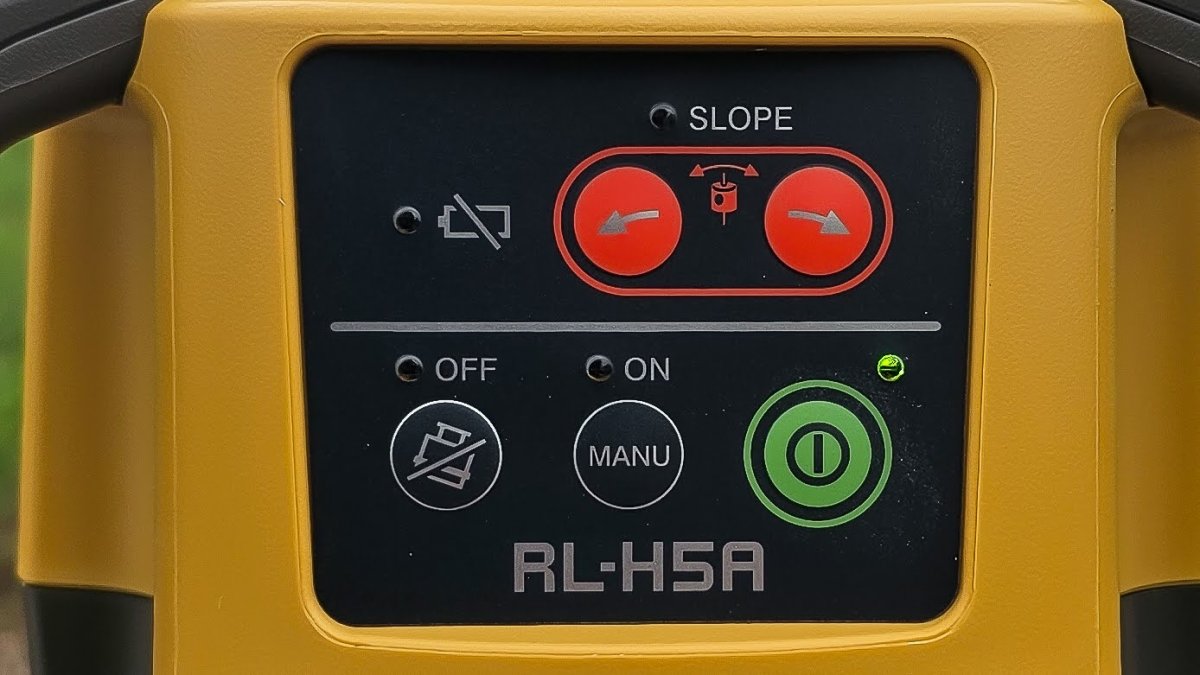
Is the Topcon laser level right for you?
This Topcon self-leveling laser level offers impressive features and is highly precise, making it a valuable tool for professionals and enthusiastic DIYers. Its beam has a range of up to 1,300 linear feet, allowing the user to establish elevation in a circle up to 2,600 feet in diameter. It’s competitively priced with similar models, and the ability to self-level is handy for creating perfectly horizontal planes.
It also allows users to shoot grade for a slope up to 5 degrees (as long as they know the basics of calculating slopes), but it doesn’t do the math for them. If you frequently need to calculate sloped grades, you may want to consider a tool designed for that purpose, such as Topcon’s Dual Slope Laser Level.
The RL-H5A is accurate to within 1/16 inch over 100 feet, making it a good choice for many construction projects that require precise leveling. This level is durable, reliable, and accurate, but it doesn’t offer a vertical laser option, which a few other models in its price range do. Ultimately, the RL-H5A is an all-around top performer for most construction projects, both professional and DIY.
Where to buy the Topcon RL-H5A rotary laser level
Get the Topcon laser level at:
Meet the Tester
Glenda Taylor is a product tester and writer specializing in the construction, remodeling, and real estate industries. She and her husband own a general contracting company, and Taylor is experienced in both residential and commercial building applications. She tests a wide range of power tools as well as other home improvement, household, and lawn-and-garden products.
